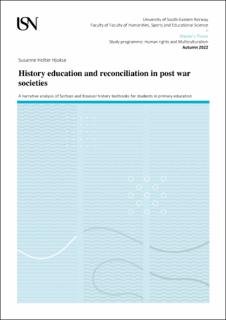| dc.description.abstract | Since the civil war in Yugoslavia in the 1990s there has been a conflicting relationship between Serbia and Kosovo. Lack of reconciliation is, according to the UN's Sustainable Development Goal 16, "Peace, justice and strong institutions", a threat to attaining sustainable development. (UN). When states live in conflict, it affects the citizens' ability to live according to what the UN and the international community call a sustainable context for development. Education in the classroom has, as former director-general of UNESCO Irina Bokova says, a bigger purpose than teaching pupils to read and write, “It is about values. It is about teaching human rights and cultural diversity, nourishing peace and fostering inclusive and sustainable development.” (Aloni, Weintrob, & Bokova, 2017).
By using a qualitative thematic and narrative analysis, this master thesis aims to investigates what narratives from the Yugoslavian war are taught the new generation in post-conflict societies. Using former enemies from civil war in the 1990s Serbia and Kosovo as a case study. With an interdisciplinary approach in social psychology, political science perspective and historicism, the study discusses what impact the interpretation of history may have on the relationship between former enemies. May it contribute to reconciliation and peaceful coexistence? — or opposite, foster more conflict?
Having an interdisciplinary approach, theories from historian John Tosh, political scientist Benedict Anderson's and psychologist Vamik D. Volkan are used as theoretical framework in the analysis (Anderson, 2006; Tosh & Lang, 2006; Volkan, 2014a). Using John Tosh concepts of uses and interpreting history. Benedict Anderson's theory is interesting because it explains how people inside states develop an imagined community based on a shared identity made by what they choose to forget and remember from history. Volkan`s theory on large-group psychology is relevant while analysing how communities are effected by traumas like conflict and war. By connecting these theories, I hope to discover just how significant the role of history is in a reconciliation process.
Key words: Reconciliation, history education, nationalism, identity, large-group psychology. | |
